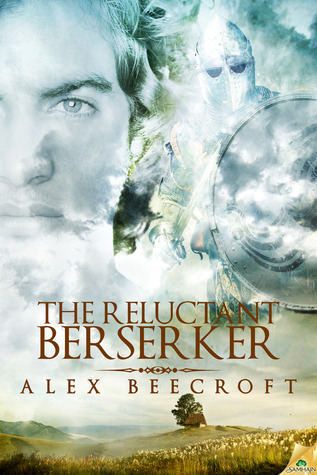Amazing. This book will be in my 'year's best' for sure.
First, I want to say that as a writer I admire good writing, especially as I read so heavily in m/m romance where the writing is often just serviceable (and not exactly the point). That's not to denigrate any author, because my own work doesn't always soar like the eagles, only to say that when I find a book where the writing is as good as any book I've ever read, I'm very impressed.
I love this author's way with prose and there are so many wonderful and original analogies in this book. Here are just a few of the dozens I highlighted:
For when he looked up, he saw that all the clouds had drawn apart. The night was on them full, and acres and acres of sharp stars were poised to fall on him with killing cold.
This disappointment was strange and ungrateful in him, he thought, tasting at the back of his throat like blood from a nosebleed.
In his frustration, Wulfstan's sodden maze of pleasure-drunken thoughts turned into a sack full of snakes.
I could go on, but that gives you an idea. I am wary of books (and I have seen some reviewed lately) where the author's voice becomes so over-wrought and egotistically poetic that the story is lost in a vomit of flowers, but that is certainly not the case here. The story and plot are always driving forward with the strong prose supporting it but never detracting from it.
As for the story/plot itself. I don't read a ton of historical fiction, but when I do, I like it to feel authentic and take me to a time and place I know little about and make me feel like I'm there. This book achieves that. The attitudes towards homosexuality, the touches of witchcraft and religion, the characters of the scobs or musicians, all felt very true to the time and I enjoyed the texture a great deal. There was action and angst and miscommunication in the plot, but thankfully the miscommunication was not overly done and neither MC was overly weak or fearful of saying what they wanted. The plot was rich and fast-paced enough that it kept me reading til the end.
Like many contemporary m/m romances, the ultimate theme is a common one--accepting who you are. Nothing really new there, yet the journey to it was unique enough that I was happy. The romance was quite good too -- both MCs were beautiful and appealing and I loved the twist of their contrary natures and how beautifully they fit together.
"Your father--" "If he has any wisdom, would accept that our wyrd is woven for us in our very nature, and all our choices only tend to that end. Better to accept fate joyfully than to fight it, for it will win no matter what we do."
I would give this book more than 5 stars for the great writing and research, the fast-paced plot and taking me to another time, but I do have one nit. After 380 pages of waiting of our MCs to finally consummate their relationship, not giving us another paragraph or two of description (at least) felt a bit stingy on the author's part. The sex is basically fade to black. I don't need pages of detailed erotica, but wanted at least to be inside Wulfstan's head as he finally got his wish and experience his joy and pleasure.
Also, I will say, it is confusing the attitude portrayed about homosexuality in the book. In this story, it was acceptable for a Lord or warrior, or any older man, to keep and use a 'boy' for sex, quite openly, but somehow incredibly shameful for any 'man' to take it up the ass. So any boy or slave who was or had been so used was reviled as womanly and weak, the ultimate insult, and would never be free of such a reputation even once grown. This may or may not be completely historically accurate in the culture portrayed in this book--which was ancient Saxony. But if accurate, the attitude is confusing as hell. I can understand the idea that a man allowing another man to f*ck him would be considered weak and shameful to a warrior society, but the easy acceptance and common occurance of a Lord having a homosexual relationship with a boy lover for years (when women were freely available in the hall) is less believable. In my research into medieval England, though men did use boys thus, it was not open and was typically in a situation like travel or battle where women were not available as an alternative. But whether or not it was 100% historically accurate for ancient Saxony, it worked for this plot and anyway, there were touches of fantasy in this (as with the witchcraft), so I can accept it in that light. It just left me curious!
Thanks for a great read, Alex Beecroft. I need to go get False Colors now.
Eli

